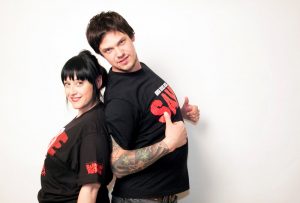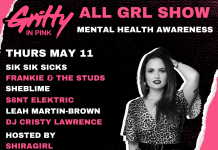By Leslie Buttonow

Before some children learn to ride a bike, they start off on a tricycle, which gives them more stability, control, and support than a two-wheeler does. As they gradually master more riding skills, they graduate up to a bicycle and gain more autonomy.
San Francisco-based label Tricycle Records follows the same philosophy and offers a similar support structure. Founded by Julie Schuchard and her business partner Don Joslin 13 years ago, her label offers a full complement of artist support services, including press relations, tour booking, graphic design and management for local artists, with a goal of launching and supporting them and growing their careers to the point where they graduate to larger, national labels. The multi-genre Tricycle Records also curates an annual compilation that brings together and showcases the best new local music currently in the Bay Area.
Fittingly, Schuchard is also a board member in her local Recording Academy chapter, and is an active participant in artist advocacy efforts.
Learn more at tricyclerecords.com.
WiMN: Let’s go back in time to your childhood. What role did music play, and how did it shape your future career path?
JS: Music has been in my life from the very start. My first memories include running around at Grateful Dead shows (my parents were fans) and as I grew older, I’d sit around with my mother singing along to old Janis Joplin, Bob Dylan, and Patsy Cline songs while she played guitar. Later, I’d pick a guitar up myself and become a songwriter. Because music was so deeply a part of my relationship with my mom, it was hard to continue when she passed away. So I picked up a camera and started documenting music. As a result, I was a music photographer for over a decade in San Francisco.
WiMN: Your record label, Tricycle Records, currently serves local San Francisco-based Indie artists. How did you get further involved in that music scene, and determine that the time was right to start your label?
JS: There was something so great about being part of the music scene in the Bay Area, but I wanted to do more. I was meeting so many artists who just needed an extra bit of help in the areas of marketing, PR, booking, even designing record packaging. So I started a label that did just that. My business partner Don Joslin, a musician in The Union Trade, had the same vision, and we built Tricycle Records together.
WiMN: Tricycle Records takes a “total package” approach in that you offer a full array of services such as PR, graphic design and tour booking. How are you able to manage all those aspects for your clients? As a photographer yourself, do you handle a lot of the creative projects?
JS: Artists have very different needs, depending on what stage they’re at in their career. One of the first things I do is look at their long term goals. There are so many things that need to be in place to successfully release a record. Some artists need help with management, some need support with marketing and PR, some need booking. It’s really different for each one. Our job is to provide support and help them work up a plan. And if I can’t execute it, I will help them find someone that does.
For artists like Geographer, they didn’t have any kind of team in place when we started working with them. So we connected them with a manager and helped them build a support team. Tricycle Records is also about being part of a community. Our artist record together and play shows together. It’s really important to have that support when you are starting out.
As a photographer, I always photograph my bands. It’s something I really enjoy, documenting the history of the label. Now that we’ve been around 13 years I can go back and find some real gems–although, my bands prefer I don’t post them. Ha ha.
WiMN: Tell us a little about your role with the local chapter of the Recording Academy and its artist advocacy efforts. How does that relate to the philosophy of your label when it comes to artist rights?
JS: I’ve been on the board for the local chapter of The Recording Academy for four years now. My work has ranged from membership and diversity outreach, to advocacy and education. I have always also tried to use my privilege of being at the table to support communities that don’t get heard. Obviously being a woman in music is a struggle. But, being a queer woman of color, now THAT is really hard. I try to use my place in the academy to recognize those voices.
It’s been an amazing experience working with the San Francisco Chapter. When I first joined, I was mentored by Kitty Margolis, who really shaped my approach to the music industry. Music is a tough industry for a woman, but I have learned that we can change it. I definitely feel empowered having a seat at the table.
WiMN: Your “Friends of Tricycle Records” compilation is now on Volume 8. In that collaborative spirit, what are some positive outcomes you’ve seen in the music community when artists work together rather than compete against one another?
JS: The Friends of Tricycle Records Compilation is my mixtape to the Bay Area. I encounter so much talent that I was really searching for a way to share the Bay Area scene with those outside of it. I usually bring someone on to collaborate with me. Andrew St. James and I curated the last one together, which was great because he turned me on to a totally different scene of musicians.
The goal of the compilation is to represent a diversity of artists from different scenes. It’s really about discovery. Finding music in your community you didn’t know was there. The artists on the compilation all promote it, but in doing so they promote other artists in the community. I absolutely love watching artists discover each other’s music and later go on to work together.
WiMN: As a female working in a traditionally male-dominated industry, do you see more opportunities opening up for women either on the artist side or the management side of the fence?
JS: I actually do see things shifting towards a more female friendly industry. Women are taking up more space in the management / booking spaces. But in terms of major label heads, there has been very little movement in that area. We still see this very strong male presence in the industry that will take years for us to dismantle. But when I look back over the last 20 years, I hear more women on the radio (and charting), have met more women leading bands, more women in the studio working as engineers, and more women in hip hop. Women are doing things their own way.
WiMN: What advice would you give to any of our readers who may be contemplating starting their own venture but wondering if the time and circumstances are right to break out of their shell?
JS: My advice to anyone working in music is simple: don’t be a d*ck. Seriously. Have integrity. Because this industry is small, and everyone knows each other, and everyone talks. (It’s like watching Gossip Girl sometimes.) There’s so much ego out there in music. But kindness will take you ten times farther. The music industry is about the relationships you build. Be genuine in your intent. Don’t waste people’s time. Be honest and trustworthy…because none of these things have ever been used to describe the music industry. And we need that to change.








